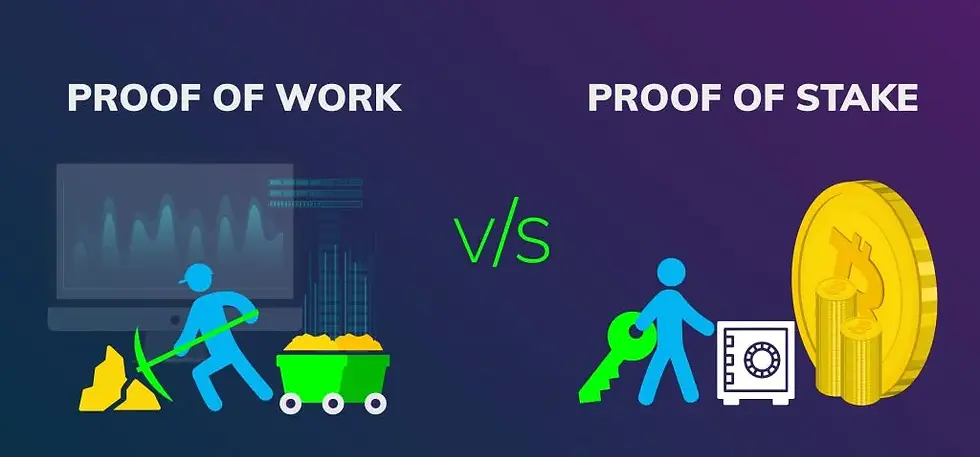Proof of Work vs Proof of Stake: Which Is the Future of Blockchain?
- Bitcoinsguide.org

- Oct 5
- 3 min read
Introduction
As blockchain technology continues to evolve, two major consensus mechanisms dominate the conversation: Proof of Work (PoW) and Proof of Stake (PoS).
These systems determine how new blocks are added to a blockchain, how transactions are verified, and ultimately, how decentralized and secure a network is.
With Ethereum's historic move to PoS in 2022 and Bitcoin’s continued reliance on PoW, many are asking: Which model is better?
And which one will define the future of blockchain?
Let’s break it down.

What Is Proof of Work (PoW)?
Proof of Work is the original consensus mechanism introduced by Bitcoin.
It requires participants (miners) to solve complex mathematical puzzles to add new blocks to the chain. This process consumes significant computational power and electricity.
🔧 How it works:
Miners compete to solve a hash puzzle.
The winner validates the block and earns rewards.
This process is repeated approximately every 10 minutes on Bitcoin.
✅ Pros:
Proven security: Bitcoin has never been hacked.
Decentralized: Anyone with hardware can mine.
Battle-tested: PoW has worked reliably for over a decade.
❌ Cons:
High energy consumption.
Expensive hardware requirement.
Slower transaction speeds and scalability limits.
What Is Proof of Stake (PoS)?
Proof of Stake is a newer, energy-efficient alternative. Instead of miners, validators are chosen to create new blocks based on how much cryptocurrency they "stake" (lock up) as collateral.
🔧 How it works:
Validators are selected pseudo-randomly.
Misbehavior can result in slashing (loss of funds).
Ethereum 2.0 uses a version called Casper FFG.
✅ Pros:
Low energy consumption.
Faster transactions and better scalability.
Lower barrier to entry for participation.
❌ Cons:
Wealth concentration risk – more coins = more influence.
Newer, less battle-tested.
Complex slashing mechanics that can confuse users.
Ethereum’s Big Shift
In 2022, Ethereum transitioned from PoW to PoS with its “Merge,” reducing its energy use by over 99%.
Why the shift?
Environmental concerns.
The need for faster, scalable transactions.
A growing DeFi and NFT ecosystem that couldn’t scale with PoW.
Despite criticisms from PoW purists, Ethereum's transition has been largely successful and paved the way for other blockchains (like Solana, Cardano, and Polkadot) that rely on PoS variants.
Bitcoin’s PoW Loyalty
Bitcoin, however, remains firmly committed to PoW — and for good reason:
Its security is unmatched.
Its simplicity keeps it decentralized.
It maintains the "digital gold" narrative through energy-backed value.
Many believe Bitcoin will remain PoW forever, even as other chains experiment with newer models.
Which Is the Future?
PoW might win in:
Security and decentralization.
Hard money narratives (like Bitcoin).
Resilience against attacks.
PoS might win in:
Mass adoption use cases (DeFi, NFTs, gaming).
Environmental friendliness.
Future regulatory approval due to sustainability.
Hybrid Models and the Road Ahead
Some chains like NEAR Protocol, Avalanche, and Polkadot are experimenting with hybrids or novel PoS variants to get the best of both worlds.
The future likely won't be binary. Instead, expect a multichain world where:
Bitcoin remains the PoW king.
Ethereum and others lead PoS innovation.
New mechanisms (like Proof of History or Proof of Space-Time) continue to emerge.

POW vs POS
Final Thoughts
Proof of Work and Proof of Stake represent more than technical designs — they reflect ideologies about what blockchain should be.
PoW values trustlessness, decentralization, and security — at all costs.
PoS values efficiency, inclusivity, and adaptability.
So which is the future?Perhaps the better question is: Which one is best for your use case?



Comments